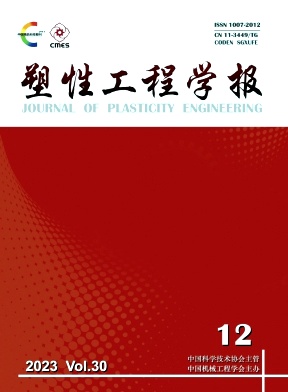Mechanism of plastic deformation in chain die forming of variable cross section
Q4 Materials Science
引用次数: 0
Abstract
Chain die forming is a new type of sheet metal forming process. The material flow law and characteristics of chain die forming process were studied through simulation. The analysis results show that the maximum principal strain at the corner of the variable section forming part is larger, and the direction is perpendicular to the outside bending surface; the maximum principal strain at the concave arc region in the flange is tensile strain, which decreases along the height direction of flange from high to low; the flange height and forming angle have great influence on the longitudinal strain of the forming part, and increasing the height of the flange and forming angle can increase the longitudinal strain of the flange; the effect of material properties on the longitudinal strain of the forming part is small. The longitudinal strain of the variable cross section was extracted from the simulation model. The results show that the four arc zones in the flange of variable cross section part have larger longitudinal strain, where tensile or compressive deformation occur during forming process, but the equivalent plastic strain mainly concentrates in bending areas of variable cross section part. The simulated results were verified through experiment of chain die forming of variable cross section tests, and the experimental results are in good agreement with the simulation results.变截面链模成形塑性变形机理研究
链式模具成形是一种新型的板料成形工艺。通过仿真研究了链式模具成形过程中物料的流动规律和特性。分析结果表明,变截面成形件拐角处的最大主应变较大,且方向垂直于外弯曲面;法兰凹弧区的最大主应变为拉应变,拉应变沿法兰高度方向从高到低逐渐减小;凸缘高度和成形角度对成形件的纵向应变有很大影响,增加凸缘高度和成型角度可以增加凸缘的纵向应变;材料性能对成形件纵向应变的影响较小。从模拟模型中提取出变截面的纵向应变。结果表明,变截面零件翼缘中的四个弧形区域具有较大的纵向应变,在成形过程中会发生拉伸或压缩变形,但等效塑性应变主要集中在变截面零件的弯曲区域。通过变截面试验对模拟结果进行了验证,实验结果与模拟结果吻合较好。
本文章由计算机程序翻译,如有差异,请以英文原文为准。
求助全文
约1分钟内获得全文
求助全文

 求助内容:
求助内容: 应助结果提醒方式:
应助结果提醒方式:


